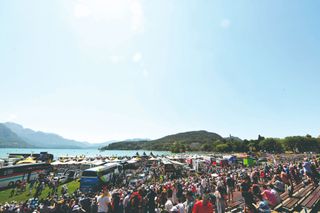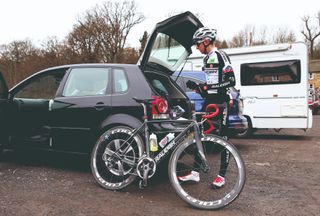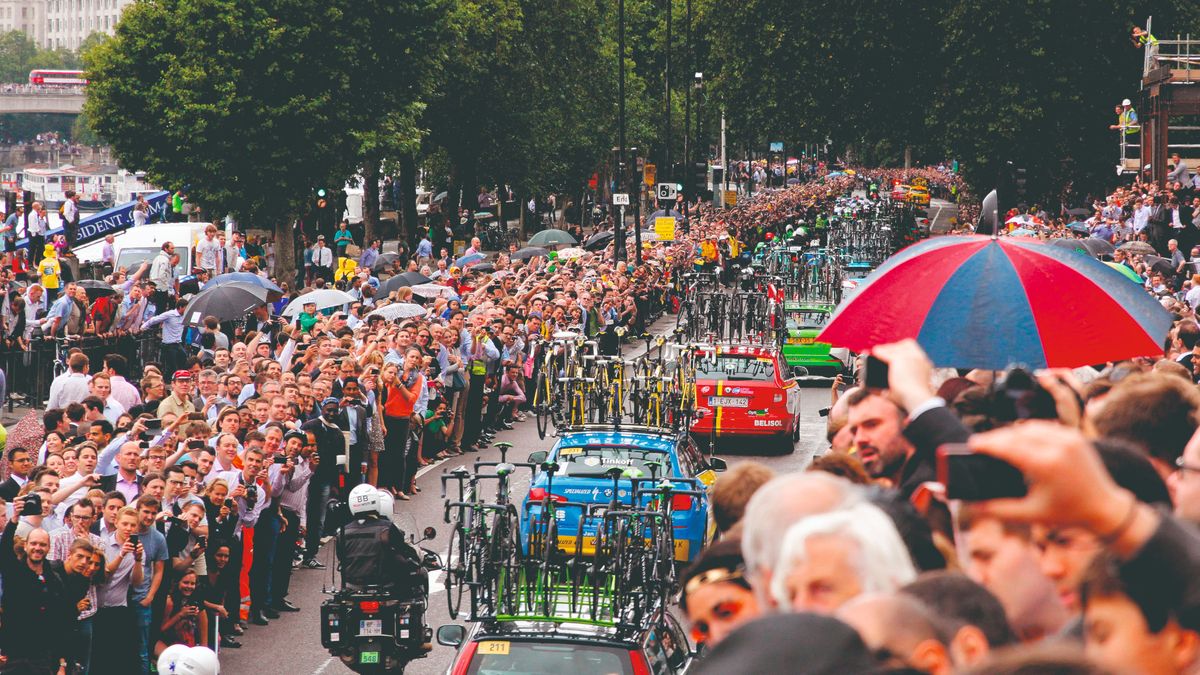As a method of transport, biking has a low environmental influence, however the identical can’t be stated for mass biking occasions. Whereas learning sustainability at college, I heard skilled street racing described as “a site visitors jam with a bunch of cyclists within the center”, which set me eager about my very own street racing. Though an beginner race generates nowhere close to the emissions of a WorldTour race, the lots of of occasions nationwide every year do have a price on the atmosphere. So what can we do to cut back our emissions?
Assessing the environmental influence of sport is the world I dwell and breathe. I’m the sustainability officer at Exeter Metropolis Soccer Membership and an MSc scholar in Exeter College’s flagship World Sustainability Options programme. I’ve been a aggressive street bicycle owner for a number of years however now concentrate on gravel racing. After I began working on this area, I knew that, if I used to be going to keep away from hypocrisy, I’d have to handle the emissions generated by biking.
Monitoring emissions
Greenhouse gases are the enemy. When launched into the ambiance they trigger our planet to warmth up, wreaking havoc on the local weather and the ecosystems we depend on. We have to quickly cut back emissions to keep away from harmful warming, primarily by ending fossil gasoline use. Carbon dioxide just isn’t the one greenhouse fuel; there are various others, akin to methane. The place you see ‘CO2e’ under, it merely means the quantity of carbon dioxide equal, a single determine that represents all of the greenhouse gases mixed. Biking, similar to each different sport, should do its half to reduce emissions.

The Tour de France introduced prime degree racing to Yorkshire in 2014, however abroad Grand Departs improve the footprint dramatically
(Picture credit score: Simon Wilkinson/SWpix.com)
I’ve organised two street races for Plymouth Corinthian CC this yr. I estimated the carbon footprint of every race largely following tips set by the Greenhouse Fuel Protocol. This highlighted the principle sources of emissions and the first alternatives to cut back environmental impacts. These calculations, although a ‘greatest guess’, are correct sufficient to indicate us the place we have to cut back emissions – perfection is commonly the enemy of progress on the planet of sustainability. The estimated emissions for our spring and summer time street races had been 1,848kg and a couple of,036kg CO2e respectively, translating to roughly 47kg and 54kg per entrant in every race.
For context, the full emissions produced by our spring race had been equal to somebody taking roughly 64 one-way practice journeys between London and Edinburgh. In the meantime, the full emissions from the summer time race had been roughly equal to somebody twice flying from London to New York and again. Taking a look at emissions per rider, the common determine of 50kg of CO2e is equal to charging your telephone over 8,000 occasions, producing one kilo of beef, or powering the common UK residence for a few fortnight. In case you competed in 20 street races throughout the season (emitting roughly 50kg of CO2e at every, totalling one tonne of CO2e) this is able to be equal to flying to Mallorca, spending per week in a resort, and flying residence once more.
Do your share

Automobile sharing can slash emissions
(Picture credit score: VAUGHN RIDLEY/SWPIX.COM)
The primary supply of emissions for our occasions got here from opponents driving (56% and 69% on the spring and summer time races, respectively). That is adopted by officers driving to the occasion (30% and 17%) and the race convoy (4% and 5%). My complete journey in the midst of organising the occasions was accountable for 4% of the emissions of every. In making these estimates, I used authorities figures for emissions produced per mile by petrol or diesel vehicles and the space between opponents’ residence postcodes and the occasion HQ. At registration, we requested opponents if that they had automotive shared and with whom. If two riders had travelled in the identical car, their emissions estimate was halved.
Our races had been held within the village of Brentor, West Devon (UK), which had only a few public transport hyperlinks and none on Sunday mornings; for many opponents, driving was the one sensible choice. In areas with denser biking populations, akin to Yorkshire or the south-east, the place opponents journey shorter distances to occasions, total emissions could also be decrease. Metropolis centre occasions, such because the UK Nationwide Circuit Sequence, are among the many few races the place opponents may doubtlessly catch a practice, although for sensible causes the overwhelming majority drive.
The most recent race content material, interviews, options, critiques and skilled shopping for guides, direct to your inbox!
Make a distinction
The Tour de France was estimated to have produced 216,388 tonnes of CO2e in 2021. For comparability, we would wish to run our summer time race a whopping 106,280 occasions to succeed in the same determine. As a rustic, we’re estimated to have emitted 384.2 million tonnes of CO2e in 2023. You’d be forgiven for considering that the few thousand kilos of CO2e produced by a home street race doesn’t matter. However you’d be mistaken. Each kilogram of carbon emissions prevented from coming into the ambiance has the potential to save lots of lives now and sooner or later. We have to cut back the emissions we are able to management.
Each kilogram of carbon emissions prevented from coming into the ambiance has the potential to save lots of lives
There’s a lot we are able to do. The largest influence you may have on an occasion’s carbon footprint is to get a elevate with a good friend. Even higher, share a automotive with two or three. The extra folks in a car, the smaller the person footprint can be. Not solely is that this a win for the planet, however it’s additionally a win on your pockets. If you wish to take it additional, take into account investing in an electrical car, which have zero tailpipe emissions. Alternatively, take the practice or, better of all, cycle.
Organisers have already got a troublesome job breaking even from occasions, and I’m reluctant so as to add extra to their plate. Nevertheless, reusing signage and different tools, or asking occasion HQs whether or not they’re on a renewable power tariff, are two simple actions that received’t damage occasion margins. When providing tea and occasional, cost extra for a disposable cup or use the venue’s mugs. Providing solely plant-based milks for tea and occasional could appear a minor element, however the carbon footprint of oat milk is lower than half that of cow’s milk.
As an organiser, I’m contemplating trialling a small environmental cost at occasions, used to offset the occasion’s emissions through a ‘Gold Customary’ offset accomplice. In case you present proof of travelling primarily by automotive share, biking, public transport or an electrical car, you’ll get that cost again at registration. Offsetting needs to be a final resort used solely as soon as emissions have been reduce to a minimal. Incentivising good environmental follow is more likely to yield higher outcomes. This could possibly be monetary, as prompt above, or take the type of a prize, a free sizzling drink token, or anything that might encourage riders to think about their journey footprint. Take into account this: if each rider had shared a automotive to our occasions, based mostly on this yr’s figures, it will have lowered our emissions by nearly a 3rd, stopping over 500kg of CO2e from being emitted for every occasion.
No matter which aspect of the fence you sit on, there’s little doubt that local weather change is going on. What we do within the subsequent decade is vital to shaping the world we go away for future generations. Your emissions may really feel insignificant, however each gram issues. Don’t underestimate the facility of your particular person actions in altering social norms for the higher. Speak in regards to the local weather, do your analysis, and get began.
BRITISH CYCLING’S EMISSIONS TARGETS: COULD THEY CUT FASTER?
Except you’ve been dwelling underneath a rock (or shell, on this occasion), you’ll have heard about British Biking’s partnership with Shell, one of many world’s largest polluters. Many sports activities are rife with a follow referred to as ‘sportswashing’ the place extremely polluting corporations sponsor sports activities groups and occasions to divert consideration away from their day-today operations. Biking is arguably one of many worst offenders, and the partnership was a PR catastrophe. Nevertheless, since signing the deal, BC has taken steps in the appropriate route with good intentions.
Launched in October, BC’s ‘Sustainable Occasions Fund,’ referred to as Speed up, is offering as much as £25,000 of grassroots funding for organisers to assist cut back the environmental footprint of their occasions. Any organiser can apply for a £250 grant, together with some detailed steering paperwork.
British Biking has a objective of internet zero by 2035 – arguably not quickly sufficient for a sport that represents a mode of transport able to revolutionising the best way we transfer round our cities and cities. It might be good to see BC pushing for internet zero by 2030, which is their present goal for halving emissions. Internet zero is the purpose at which no internet emissions are produced, taking into consideration carbon seize and storage (CCS).
Some argue that the phrase ‘internet zero’ is little greater than a buzzword, and that we needs to be aiming for as near absolute zero as attainable, minimising offsets and CCS. However internet zero is the goal, and it does characterize progress. The earlier British Biking can cross this explicit end line, the higher.
This text was initially printed in Biking Weekly journal. Subscribe now and by no means miss a problem.


